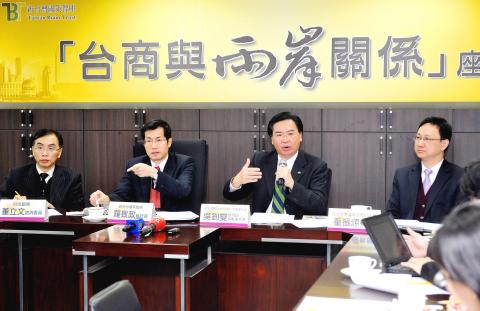Until China acts in a more friendly fashion toward Taiwan, Taipei should bar Association for Relations Across the Taiwan Strait Chairman Chen Yunlin (陳雲林) from visiting next week, a former Mainland Affairs Council chief said yesterday.
Joseph Wu (吳釗燮), who is also a former envoy to Washington, said Taiwanese would have no reason to oppose Chen’s visits if cross-strait negotiations could advance relations, improve Taiwan’s economic development and protect the interests of China-based Taiwanese businesspeople.
However, questions should be raised if the purpose of his visits is to make empty promises, cause disturbances or divide Taiwan, Wu told a forum on China-based Taiwanese businesspeople and cross-strait relations organized by Taiwan Brain Trust, a think tank.

Photo: Chien Jung-fong, Taipei Times
“The administration of President Ma Ying-jeou (馬英九) should be held fully responsible if it fails to express the displeasure of many Taiwanese with China’s recent maneuvers in denigrating Taiwan’s sovereignty and international space,” he said.
Wu urged the Ma administration to take better stock of China’s military threat and the damage it has done to Taiwan in the international arena.
Even some Chinese Nationalist Party (KMT) members have serious doubts about China’s intentions vis-a-vis Taiwan’s sovereignty and participation in international organizations, he said.
“The Mainland Affairs Council should tell [China’s] Taiwan Affairs Office that it is not the right time for Chen to visit and that Taiwan will only welcome him if things improve,” he said.
Wu said the Democratic Progressive Party (DPP) should establish a center to offer legal and consultation services to Taiwanese businesspeople based in China.
“Only with a strong opposition will Beijing take Taiwan more seriously,” Wu said.
Tung Li-wen (董立文), a professor at the Graduate School of Public Security at Central Police University, said the stronger the DPP, the better the position of Taiwanese businesspeople in China would be.
“Taiwan can do a lot of things to get what it wants, as China must win the hearts of Taiwanese before it gets what it wants,” he said.
Tung urged the DPP to be more proactive in courting China-based Taiwanese businesspeople and protecting their interests.
Tung Chen-yuan (童振源), director of National Chengchi University’s Prediction Market Center, said the Ma administration owed Taiwanese an explanation as to why the individual safety of China-based Taiwanese businesspeople continued to deteriorate while cross-strait relations ostensibly improve.
“It shows the channel [of communication] between the KMT and Chinese Communist Party is of questionable value,” he said.
With the legislative and presidential elections fast approaching, Lo Chih-cheng (羅致政), chief executive of Taiwan Brain Trust, said he suspected China would be more willing to offer economic sweeteners to Taiwan while remaining inflexible on the diplomatic front.
He said the administration should not be afraid of negotiating with China and that it should not do so out of fear.
“If the reason the administration negotiates with China is because it is afraid that cross-strait relations would regress, then Taiwan has no bargaining chip whatsoever,” Lo said. “The beauty of democracy is that some play ‘good cop’ and some play ‘bad cop.’ While the council played the bad cop when the DPP was in power, it is now playing the good cop better than anyone else.”

CHANGING LANDSCAPE: Many of the part-time programs for educators were no longer needed, as many teachers obtain a graduate degree before joining the workforce, experts said Taiwanese universities this year canceled 86 programs, Ministry of Education data showed, with educators attributing the closures to the nation’s low birthrate as well as shifting trends. Fifty-three of the shuttered programs were part-time postgraduate degree programs, about 62 percent of the total, the most in the past five years, the data showed. National Taiwan Normal University (NTNU) discontinued the most part-time master’s programs, at 16: chemistry, life science, earth science, physics, fine arts, music, special education, health promotion and health education, educational psychology and counseling, education, design, Chinese as a second language, library and information sciences, mechatronics engineering, history, physical education

The Chinese military has boosted its capability to fight at a high tempo using the element of surprise and new technology, the Ministry of National Defense said in the Quadrennial Defense Review (QDR) published on Monday last week. The ministry highlighted Chinese People’s Liberation Army (PLA) developments showing significant changes in Beijing’s strategy for war on Taiwan. The PLA has made significant headway in building capabilities for all-weather, multi-domain intelligence, surveillance, operational control and a joint air-sea blockade against Taiwan’s lines of communication, it said. The PLA has also improved its capabilities in direct amphibious assault operations aimed at seizing strategically important beaches,

New Taipei City prosecutors have indicted a cram school teacher in Sinjhuang District (新莊) for allegedly soliciting sexual acts from female students under the age of 18 three times in exchange for cash payments. The man, surnamed Su (蘇), committed two offenses in 2023 and one last year, the New Taipei District Prosecutors’ Office said. The office in recent days indicted Su for contraventions of the Child and Youth Sexual Exploitation Prevention Act (兒童及少年性剝削防制條例), which prohibits "engaging in sexual intercourse or lewd acts with a minor over the age of 16, but under the age of 18 in exchange for

The High Prosecutors’ Office yesterday withdrew an appeal against the acquittal of a former bank manager 22 years after his death, marking Taiwan’s first instance of prosecutors rendering posthumous justice to a wrongfully convicted defendant. Chu Ching-en (諸慶恩) — formerly a manager at the Taipei branch of BNP Paribas — was in 1999 accused by Weng Mao-chung (翁茂鍾), then-president of Chia Her Industrial Co, of forging a request for a fixed deposit of US$10 million by I-Hwa Industrial Co, a subsidiary of Chia Her, which was used as collateral. Chu was ruled not guilty in the first trial, but was found guilty